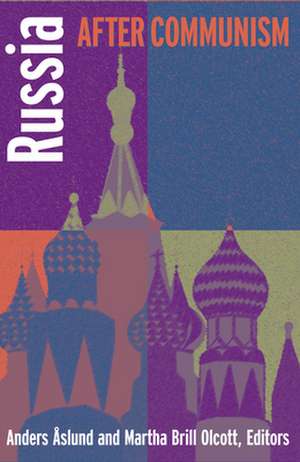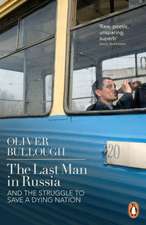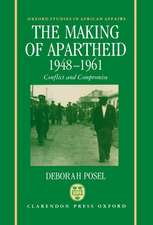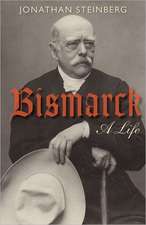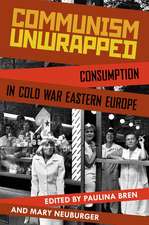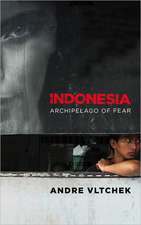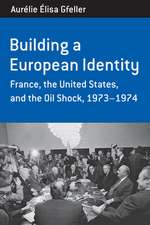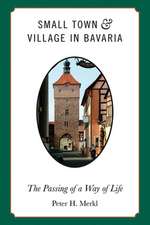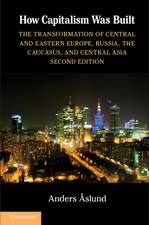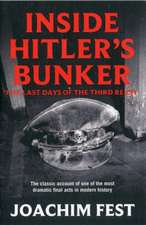Russia After Communism
Editat de Anders Aslund, Martha Brill Olcotten Limba Engleză Paperback – iul 1999
Five years have passed since the collapse of the Soviet Union, and a new political and economic system has evolved in Russia. Russia After Communism provides an overall assessment of what has been accomplished and what has failed to date, and where Russia is heading. In a unique collaborative effort, the book features chapters on major issues written by pairs of leading Russian and American scholars.
Michael McFaul and Nikolai Petrov analyze the Russian elections since 1989 and assess voting behavior. Scott Bruckner and Lilia Shevtsova address the question of whether Russia has become a stable pluralist society. Martha Brill Olcott and Valery Tishkov focus on the nature of the Russian nation as well as regional relations. Russia has become a market economy, but what kind of capitalism is being formed? Anders Aslund and Mikhail Dmitriev examine the continuing challenge of economic reform. Sherman Garnett and Dmitri Trenin analyze Russia's relations with its nearest neighbor. Stephen Sestanovich examines Russia's place in the world.
Michael McFaul and Nikolai Petrov analyze the Russian elections since 1989 and assess voting behavior. Scott Bruckner and Lilia Shevtsova address the question of whether Russia has become a stable pluralist society. Martha Brill Olcott and Valery Tishkov focus on the nature of the Russian nation as well as regional relations. Russia has become a market economy, but what kind of capitalism is being formed? Anders Aslund and Mikhail Dmitriev examine the continuing challenge of economic reform. Sherman Garnett and Dmitri Trenin analyze Russia's relations with its nearest neighbor. Stephen Sestanovich examines Russia's place in the world.
Preț: 92.77 lei
Nou
Puncte Express: 139
Preț estimativ în valută:
17.75€ • 18.58$ • 14.69£
17.75€ • 18.58$ • 14.69£
Carte disponibilă
Livrare economică 15-29 martie
Preluare comenzi: 021 569.72.76
Specificații
ISBN-13: 9780870031519
ISBN-10: 0870031511
Pagini: 166
Dimensiuni: 152 x 229 x 15 mm
Greutate: 0.27 kg
Ediția:New.
Editura: Brookings Institution Press
Colecția Carnegie Endowment for Int'l Peace
Locul publicării:United States
ISBN-10: 0870031511
Pagini: 166
Dimensiuni: 152 x 229 x 15 mm
Greutate: 0.27 kg
Ediția:New.
Editura: Brookings Institution Press
Colecția Carnegie Endowment for Int'l Peace
Locul publicării:United States
Notă biografică
Anders Aslund and Martha Brill Olcott are senior associates at the Carnegie Endowment for International Peace in Washington, D.C., which since 1993 has operated a Moscow Center for public research now comprising eighteen Russian and American scholars.
Descriere
Five years have passed since the collapse of the Soviet Union, and a new political and economic system has evolved in Russia. Russia After Communism provides an overall assessment of what has been accomplished and what has failed to date, and where Russia is heading. In a unique collaborative effort, the book features chapters on major issues written by pairs of leading Russian and American scholars.
Michael McFaul and Nikolai Petrov analyze the Russian elections since 1989 and assess voting behavior. Scott Bruckner and Lilia Shevtsova address the question of whether Russia has become a stable pluralist society. Martha Brill Olcott and Valery Tishkov focus on the nature of the Russian nation as well as regional relations. Russia has become a market economy, but what kind of capitalism is being formed? Anders Aslund and Mikhail Dmitriev examine the continuing challenge of economic reform. Sherman Garnett and Dmitri Trenin analyze Russia's relations with its nearest neighbor. Stephen Sestanovich examines Russia's place in the world.
Michael McFaul and Nikolai Petrov analyze the Russian elections since 1989 and assess voting behavior. Scott Bruckner and Lilia Shevtsova address the question of whether Russia has become a stable pluralist society. Martha Brill Olcott and Valery Tishkov focus on the nature of the Russian nation as well as regional relations. Russia has become a market economy, but what kind of capitalism is being formed? Anders Aslund and Mikhail Dmitriev examine the continuing challenge of economic reform. Sherman Garnett and Dmitri Trenin analyze Russia's relations with its nearest neighbor. Stephen Sestanovich examines Russia's place in the world.
